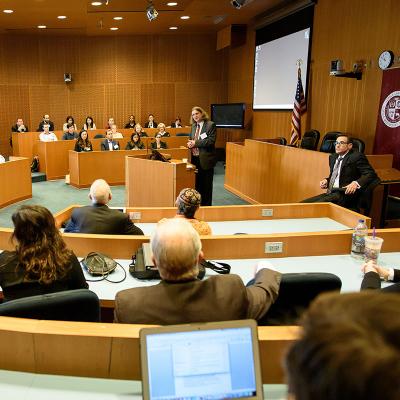Loyola Center for Study of Law & Genocide Looks at Contemporary Atrocities & Challenges to Their Prevention, Prosecution

The Center for the Study of Law & Genocide (CSLG) at Loyola Law School, Los Angeles hosted “New Challenges to Justice: Genocide in the 21 Century,” a two-day event featuring a symposium on the unique issues posed by modern atrocities and a documentary film screening, Oct. 11-12 on Loyola’s downtown L.A. campus. The event was co-sponsored by Jewish World Watch.
The event began on Thursday, Oct. 11 with a screening of “Amae, Thamee, Ama,” a short film about atrocities committed against women by the Burmese military. It was followed by a panel discussion featuring R. Michael Ghilezan, associate producer, Kirana Productions, and Ann Strimov Durbin, director of advocacy & grantmaking, Jewish World Watch. The panel was moderated by Rajika L. Shah, deputy director, CSLG and Loyola’s International Human Rights Clinic.
On Friday, Oct. 12, the symposium began with the panel “Challenges to Securing Post-Conflict Justice.” It featured speakers David Akerson, former senior legal advisor, Commission for International Justice and Accountability; Sam Garkawe, adjunct professor, School of Law and Justice, Southern Cross University, Australia; and Margarete Feinstein, senior lecturer, Jewish Studies Program, Loyola Marymount University. The panel was moderated by Professor David Glazier, Lloyd Tevis Fellow, Loyola Law School.
The opening panel was followed by the lunchtime keynote address, “Genocide & Memory,” delivered by Professor Michael Bazyler, 1939 Law Scholar in Holocaust and Human Rights Studies, Dale E. Fowler School of Law, Chapman University. He was introduced by Ami Friedman Cecil, director of community engagement, Jewish World Watch.
The last panel featured Ghilezan, a partner at Global Legal Law Firm; Professor Stanley Goldman, director, CSLG; and Dydine Umunyana, author, "Embracing Survival," replaced. The panel was moderated by Jessica Peake, director, International and Comparative Law Program, UCLA School of Law. During the panel, Goldman read an excerpt from his forthcoming book, “Left to the Mercy of a Rude stream: The Bargain that Broke Adolf Hitler and Saved My Mother.”
“After decades of progress toward a robust legal regime to prevent and punish genocide, and provide redress for its consequences, the first two decades of the 21st century have seen a resurgence in the commission of genocides around the world, numerous setbacks in international prosecutions, and the failure of efforts to replicate the success of the Holocaust restitution settlements for other survivor and victim groups,” said Shah. “This conference –bringing together lawyers, academics, historians and activists – seeks to answer: Where do we go from here?”
All components of the event were held on Loyola Law School’s campus at 919 Albany St., Los Angeles, CA 90015. A complete agenda and other details are available online.
The CSLG couples research and practical advocacy to help victims of genocide achieve justice. Founded in 2007, it aims to promote legal scholarship on genocide and mass violations of human rights with a particular focus on improving and making more accessible and effective legal resources and remedies both in the U.S. and internationally. It also seeks to train current and future legal practitioners on using existing remedies to help victims of genocide and mass violations of human rights achieve a measure of justice. Learn more on the CSLG website.
The work we do at Loyola matters. Find out more or apply now.